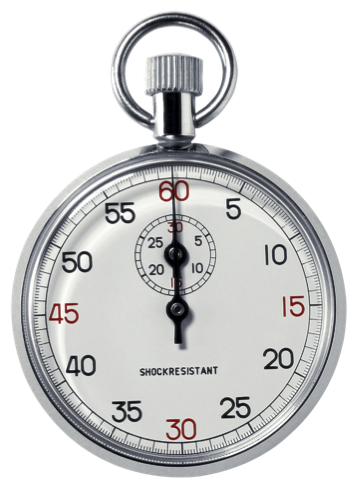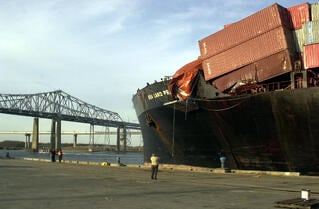3 Common International Shipping Mistakes and How To Avoid Them
1. Mistiming an Import or Export
 Timing is important for everything in life. For international shipping, timing is crucial.
Timing is important for everything in life. For international shipping, timing is crucial.
Properly timing a shipment can be tricky for the inexperienced. This is why mistiming an import or export is a common international shipping mistake, especially for first time shippers.
Perhaps you want a shipment imported or exported fast. You get a quote and find out the transit time alone is over two weeks. If you promised the goods sooner, this could be a serious problem.
A common situation new shippers find themselves in is getting a freight rate quote, waiting, and then trying to set up the shipment only to find their freight rate quote has expired.
Generally speaking, the fastest way to ship goods internationally is by air. Often, air cargo is more expensive than ocean freight and best to do with small to medium sized shipments. Larger shipments are commonly better to ship containerized by ocean freight.
When it comes to timing international shipping, time for loading, transit to and from ports or terminals, and terminal cutoffs are among things that must be considered.
How To Avoid this Mistake
Research shipping times.
With just a little bit of online research, you can get a decent approximation of how long it will take to import or export from one specific location to another. For more specific details on how long a shipment will take, call a freight forwarder or shipping company that regularly imports or exports between the origin and destination locations you’re looking for.
It will be much easier to properly plan your time tables having done a little bit of homework ahead of time.
Get a quote within a month of your shipment date.
Shipping rates are extremely volatile. As a general rule, freight rates are good for about a month.
So prepare for your shipment, have all the details ready for your freight forwarder, and give them a call or fill out a freight rate request within 30 days of when you want to ship your goods.
2. Failing to Properly Insure Goods
 Damaged or stolen goods happen. Ships crash, modern piracy exists and is quite strong in some waters, temperatures can go up into triple digits and fall below freezing on the same voyage, cargo gets jostled, falls overboard…
Damaged or stolen goods happen. Ships crash, modern piracy exists and is quite strong in some waters, temperatures can go up into triple digits and fall below freezing on the same voyage, cargo gets jostled, falls overboard…
Stuff happens. That’s why cargo insurance is important.
Too often, shippers try to bipass insurance or improperly insure their goods.
Insurance is different for different types of goods. For example, household goods have to be professionally packed by certified professionals in order to be insured. Not knowing little things like this, some people have paid money and thought their cargo was insured when, because of something like how their goods were packed, they’d bought worthless insurance.
It’s important to not only insure the cargo you’re importing or exporting, but properly insure it.
How To Avoid this Mistake
Learn about your insurance options.
Discuss insurance options with your freight forwarder or shipping company. Most will have insurance options to offer you so you don’t have to go to an outside company.
In the discussion, make sure you talk about what kind of cargo you are importing or exporting, what the insurance does and does not cover, and any special provisions of the insurance policy options.
3. Going with the Cheapest Freight Rate Possible
 This is a mistake that really gets people.
This is a mistake that really gets people.
You’re an international businessperson out to make the best profit you can or a frugal person shipping your household goods to another country so you shop around, find the lowest freight rate possible, and go with that company.
But wait. The rate, while important, is not the most important thing when choosing a freight forwarder or international shipping company.
Universal Cargo Management works hard to get the best best rates we can for you whether you’re shipping to or from China or anywhere else in the world; but, we work even harder to make sure everything goes smoothly with your shipment.
When choosing a freight forwarder or shipping company, it’s important to consider a number of factors. How long have they been in business? How responsive are they to you as a customer? How knowledgeable are they about what you’re shipping and the regulations of the country you’re shipping to? Will they know what to do if something goes wrong?
A freight forwarder or shipping company that has not been in business long often lacks the experience and know-how to handle all the little details that can complicate international shipping in order to ensure a smooth import or export experience.
Choosing the company with the cheapest freight rates may become much more costly if your shipment gets delayed, held up at customs, lost, or mishandled.
I’m trying really hard to avoid the old cliché, you get what you pay for…
Ways to Avoid this Mistake
Check how long the freight forwarder or shipping company has been in business.
There’s a big difference in how secure you’ll feel with a company that has only been in business a handful of months or years as opposed to a company like Universal Cargo Management that’s been a trusted freight forwarder for nearly 30 years.
See if the company has references.
You’re more likely to have a positive experience with a company that has a good track record of customer satisfaction.
Ask about the freight forwarder or shipping company’s experience with your type of goods and the country you’re exporting to or importing from.
Wording here is important. Don’t just ask if the company has experience. The sales rep could just say yes and keep moving. Ask about the experience.
Your sales rep or account manager may not know the answers offhand as to the company’s history with your goods or the country you’re importing from or exporting to. And that’s okay, but they should be able to find out for you.
![]()
Source: Export

